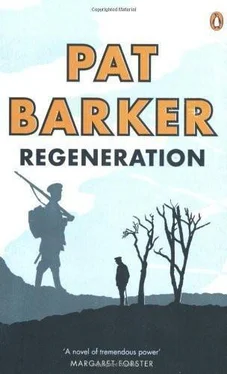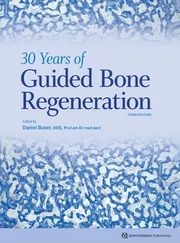Yealland said, ‘You will leave this room when you are speaking normally. I know you do not want the treatment suspended now you are making such progress. You are a noble fellow and these ideas which come into your mind and make you want to leave me do not represent your true self. I know you are anxious to be cured and are happy to have recovered to such an extent; now you are tired and cannot think properly, but you must make every effort to think in the manner characteristic of your true self: a hero of Mons .’
Perhaps Callan remembered, as Yealland apparently did not, that Mons had been a defeat. At any rate he went back to the chair.
‘You must utter a sound,’ Yealland said. ‘I do not care what the nature of the sound is. You will understand me when I say I shall be able to train any sound into the production of vowel sounds, then into letter sounds, and finally into words and sentences . Utter a sound when you take a deep breath, and as soon as I touch your throat.’
Callan, although he appeared to be co-operating, could make no expiratory sound.
Yealland appeared to lose patience. He clamped his hands down on to Callan’s wrists and said, ‘This has gone on long enough. I may have to use a stronger current. I do not want to hurt you, but if necessary I must.’
Rivers couldn’t tell whether the anger was acted or real, but there was no doubt about the strength of the current being applied to the neck in shock after shock. But it worked. Soon Callan was repeating ‘ah’ at a normal pitch, then other sounds, then words. At this point Yealland stopped the use of electricity, and Callan sagged forward in the chair. He looked as if he were going to fall, but the straps held him in place. ‘Go on repeating the days,’ Yealland said.
‘S-s-s-sunday. M-m-m-m-m-monday. T-t-t-t-tuesday…’
Saturday came at last.
Yealland said, ‘Remember there is no way out, except by the return of your proper voice and by that door. I have one key, you have the other. When you can talk properly, I shall open the door and you can go back to the ward.’
And so it went on, through the alphabet, the days of the week, the months of the year — the shocks sometimes mild, sometimes extremely strong — until he was speaking normally. As soon as he could say words clearly at a normal pitch, he developed a spasm or tremor — not unlike paralysis agitans — in his left arm. Yealland applied a roller electrode to the arm. The tremor then reappeared in the right arm, then the left leg, and finally the right leg, each appearance being treated with the application of the electrode. Finally the cure was pronounced complete. Callan was permitted to stand up. ‘Are you not pleased to be cured?’ Yealland asked.
Callan smiled.
‘I do not like your smile,’ Yealland said. ‘I find it most objectionable. Sit down.’
Callan sat.
‘This will not take a moment,’ Yealland said. ‘Smile.’
Callan smiled and the key electrode was applied to the side of his mouth. When he was finally permitted to stand up again, he no longer smiled.
‘Are you not pleased to be cured?’ Yealland repeated.
‘Yes, sir.’
‘Nothing else?’
A fractional hesitation. Then Callan realized what was required and came smartly to the salute. ‘Thank you, sir.’
That evening after dinner Rivers tried to work on a paper he was due to give to the Royal Society of Medicine in December. As he read through what he’d written, he became aware that he was being haunted by images. The man in the corridor at Queen Square, Yealland’s hands, Callan’s open mouth, the two figures, doctor and patient, walking up and down, in and out of the circle of light round the battery. It was unusual for Rivers to visualize as intensely as this, indeed to visualize at all, but then the whole experience, from beginning to end, had had something… hallucinatory about it.
Rivers left the typewriter and went to sit in his armchair by the fire. As soon as he abandoned the attempt to concentrate on the paper, he knew he was ill. He was sweating, his heart pounded, pulses all over his body throbbed, and he felt again that extraordinary sensation of blood squeezing through his veins. He thought he might have a slight temperature, but he never, as a matter of principle, took his own temperature or measured his pulse. There were depths of neuroticism to which he was not prepared to sink.
His confrontation with Yealland had exhausted him, for, however polite they had each been to each other, it had been a confrontation. He was too tired to go on working, but he knew if he went to bed in this state he wouldn’t sleep, even if there was no disturbance from the guns. He decided to take a turn on the Heath, fetched his greatcoat from the peg and crept downstairs. Mrs Irving was a pleasant enough woman, but she was also a very lonely woman, and inclined to air her grievances about the excessive demands of Belgian refugees. He reached the bottom of the stairs, listened a moment, then quietly let himself out of the house.
He felt his way along the dark street. Shuttered windows, like blind eyes, watched from either side. It was something new this darkness, like the deep darkness of the countryside. Even on the Heath, where normally London was spread out before you in a blaze of light, there was only darkness, and again darkness. Starlight lay on the pond, waking a dull gleam, like metal. Nothing else. He started to walk round the edge, trying to empty his mind of Queen Square, but the images floated before him like specks in the eye. Again and again he saw Callan’s face, heard his voice repeating simple words, a grotesque parody of Adam naming created things. He felt pursued. There they were, the two of them, Yealland and his patient, walking up and down inside his head. Uninvited. If this was what habitual visualizers experienced, he could only say he found it most unpleasant.
He stopped and looked at the pond. He was aware of rustling, dragging footsteps. Somebody bumped into him and muttered something, but he moved away. By the time he got back to his lodgings he felt much better, well enough to greet Mrs Irving in the hall and compliment her on a more than adequate dinner.
Back in his own rooms he went straight to bed. The sheets felt cold, so cold he again wondered if he was running a temperature, but at least the palpitations and the breathlessness had gone. He thought he might manage to sleep if the Zeppelins and the guns allowed it, and indeed he did fall asleep almost as soon as he turned off the light.
He was walking down the corridor at Queen Square, an immensely long corridor which elongated as he walked along it, like a strip of elastic at full stretch. The swing doors at the far end opened and shut, flap-flapping an unnaturally long time, like the wings of an ominous bird. Clinging to the rail, the deformed man watched him approach. The eyes swivelled to follow him. The mouth opened and out of it came the words: I am making this protest on behalf of my fellow-soldiers because I believe the war is being deliberately prolonged by those who have the power to end it .
The words echoed along the white corridor. Abruptly the dream changed. He was in the electrical room, a pharyngeal electrode in his hand, a man’s open mouth in front of him. He saw the moist, pink interior, the delicately quivering uvula, the yellowish, gramy surface of the tongue, and the tonsils, like great swollen, blue-purple eggs. He slipped the tongue depressor in, and tried to apply the electrode, but the electrode, for some reason, wouldn’t fit. He tried to force it. The man struggled and bucked beneath him, and, looking down, he saw that the object he was holding was a horse’s bit. He’d already done a lot of damage. The corners of the man’s mouth were raw, flecked with blood and foam, but still he went on, trying to force the bit into the mouth, until a cry from the patient woke him. He sat up, heart pounding, and realized he had himself cried out. For a second the dream was so real that he went on seeing the chair, the battery, the tortured mouth. Then, nothing. Gradually, his heart beat returned to normal, though when he got out of bed and went across to sit by the window the small effort made it pound again.
Читать дальше












